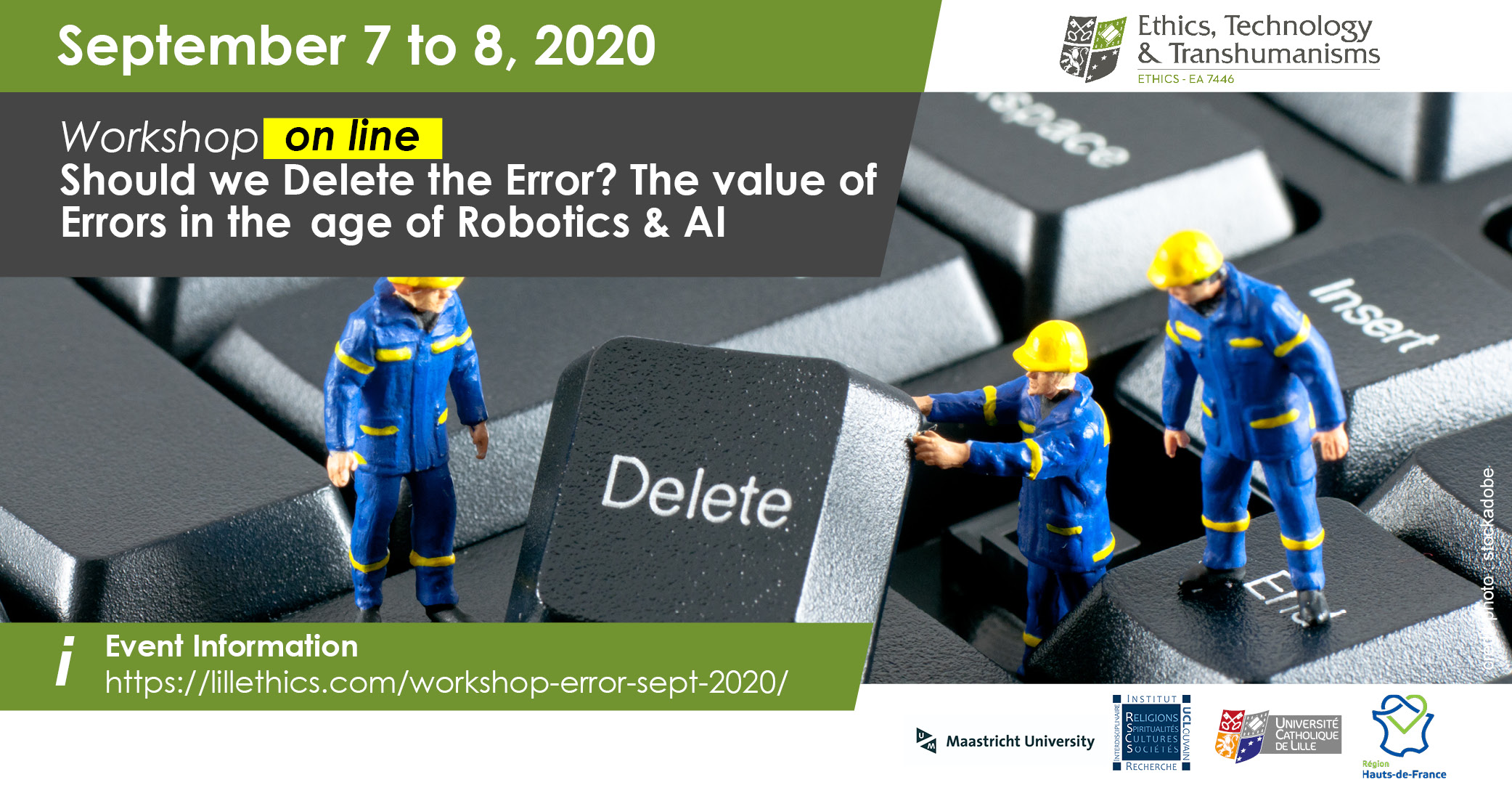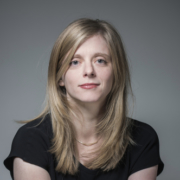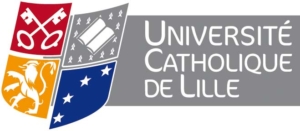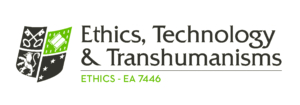Introductory Word
Good morning to all of you,
By logging in on this page, you take part in the workshop « Should we Delete the Error? The value of Errors in the age of Robotics & AI » organized online from this page, on Monday 7 and Tuesday 8 September 2020.
No registration is necessary.
- For the program of this Monday, September 7, you are invited to follow the different interventions of the speakers. You will find below, on this page, the links to their filmed interventions.
- For the program of this Tuesday, September 8, the organized round tables will be held live via zoom at the times indicated below. We thank you in advance for your punctuality.
Note: The video interventions of the speakers on Monday, September 7 are in either French or English; the round tables on September 8 will be held in either French or English (see program below).
Mot d’introduction
Bonjour à toutes et tous,
En vous connectant sur cette page, vous prenez part au workshop « Should we Delete the Error? The value of Errors in the age of Robotics & AI » organisé en ligne depuis cette page, ces lundi 7 et mardi 8 septembre 2020.
Aucune inscription n’est nécessaire.
- Pour le programme de ce lundi 7 septembre, vous êtes invités à suivre les différentes interventions des speakers dont vous trouverez ci-dessous, sur cette page, les liens vers leurs interventions filmées.
- Pour le programme de ce mardi 8 septembre, les tables rondes organisées se tiendront en direct via zoom aux horaires indiqués plus bas. Nous vous remercions d’avance pour votre ponctualité.
Remarque : Les interventions vidéos des conférenciers le lundi 7 septembre sont soit en français ou en anglais; les tables rondes du 8 septembre se dérouleront en français ou en anglais (voir programme ci-dessous).
Organizers
Talitha COOREMAN-GUITTIN
Daryl CRESSMAN
Jacques PRINTZ
Marie-des-Neiges RUFFO DE CALABRE
Contacts
Marie-des-Neiges RUFFO DE CALABRE
m.ruffodecalabre@univ-catholille.fr
David DOAT
david.doat@univ-catholille.fr
Presentation
One of the myths that informs the popular imaginaries and discourses of AI and robotics is that these technologies will work as planned. This deterministic expectation is, of course, an illusion. From unintended consequences to functional errors and malfunctions, the trajectory of what counts as ‘working’ is often different in practice than it is in planning.
Given this, how can we consider the value of error? This workshop will focus on the different meanings that errors, malfunctions, and other unexpected consequences take on in the field of AI and Robotics across a range of applications, including (but not limited to) health care, security and surveillance, consumerism, identity, justice, insurance, and labour.
This call for papers is open to researchers from all disciplines and levels (PhD Student, post-doc, faculty) to propose an interdisciplinary reconstruction of the reading of the concept of error in the age of AI and robotics, starting from the question «Should we delete the error?».
Contribution proposals are expected to respond to the following five questions, but submissions on all dimensions of error will be considered.
– Do errors shed light on societal prejudices?
– How and why do mathematics sometimes erroneously shape our understanding of reality? What’s the power on and (in)adequacy of mathematics to reality?
– Can humans intentionally mislead machines?
– Are errors always functional, or do errors also occur when technologies disrupt socio-economic contexts? What can we learn from this ?
– Can machine errors open up trajectories on the improvement and enhancement of humanity that differs from the transhumanist project?
Présentation
L’un des mythes qui alimentent les imaginaires et discours populaires sur l’IA et la robotique est que ces technologies fonctionneront comme prévu. Cette attente déterministe est, bien entendu, une illusion. Entre les conséquences inattendues, les erreurs fonctionnelles ou les dysfonctionnements, ce qui « en théorie fonctionne » s’avère souvent différent en pratique.Ceci étant, peut-on accorder une valeur aux erreurs? La journée d’étude se concentrera sur
les différentes significations que les erreurs, les dysfonctionnements et autres conséquences inattendues peuvent avoir dans le domaine de l’IA et de la robotique à travers une gamme d’applications, notamment (mais sans s’y limiter) les soins de santé, la sécurité et la surveillance, la consommation, l’identité, la justice, les assurances et le travail.
Welcoming Address
Keynotes
Pascal Rivière
Chef de l’inspection générale
INSEE
Pascal Rivière has directed the INSEE General Inspection since 2016, which carries out audit, evaluation and prospective work for this institute. He has devoted a large part of his career to information systems, with a particular interest in data quality: at INSEE, in the hospitals, for the social security, but also through a course dispensed at the CNAM.
Pascal Rivière co-wrote a work on information systems repositories in 2013. A former student of Polytechnique and ENSAE, he is Doctor in computer science and associate professor of mathematics.
Pascal Rivière dirige depuis 2016 l’Inspection générale de l’Insee, qui effectue les travaux d’audit, évaluation et prospective pour cet institut. Il a consacré une grande partie de sa carrière aux systèmes d’information, avec un intérêt particulier pour la qualité de données : à l’Insee, dans le monde hospitalier, celui de la sécurité sociale, mais aussi dans le cadre d’un cours dispensé au CNAM.
Pascal Rivière a coécrit un ouvrage sur les référentiels des systèmes d’information en 2013. Ancien élève de Polytechnique et de l’ENSAE, il est docteur en informatique et agrégé de mathématiques.
Dr. Katleen Gabriels
Assistant Professor
Department of Philosophy Faculty of Arts and Social Sciences
Maastricht University
Katleen Gabriels is a moral philosopher, specialized in computer ethics. She is an assistant Professor at Maastricht University (FASoS, Department of Philosophy). She researches the relations and co-shapings between morality and computer technologies.
Katleen Gabriels est spécialisée en philosophie morale, en particulier l’éthique informatique. Elle est professeur adjointe à l’Université de Maastricht (FASoS, Département de philosophie). Ses recherches portent sur les relations et les co-modelages entre la morale et les technologies informatiques.
Program
DAY 1 – SEPTEMBER 7TH
First Part – Theory of error
Abstracts are available by clicking on the titles of the interventions.
Les abstracts sont disponibles en cliquant sur les titres des interventions.
Machine(s) learning morals
KEYNOTE SPEAKER
Dr. GABRIELS Katleen, assistant professor, Maastricht University
What place for error in the creative act? A theological approach
Dr. CORREMAN-GUITTIN Talitha, UCLouvain, Faculté de théologie
Universality of error
PRINTZ Jacques, professor Ethics, Université Catholique de Lille
Malfunction notions in AI and design
KARAKAS Alexandra, PhD Student, Budapest, Hungary
Unbecoming Robot and the Theatrics of Brokeness
XU Rowen, PhD candidate, Utrecht University
IA artificial error as non-compliance with a natural expectation
TOUVET Peggy, teacher, Université de technologie de Troyes, ECT lab de l’Université européenne de Technologie
Only the abstract is available
Take a break, play the game
IA education by Maxime Hornot
Students from the Pole 3D school, directed by Alberto ROMELE (ETHICS, Université Catholique de Lille), produced a prototype of video games to illustrate the difficulty of programming an AI and the ethical conflicts that can arise in the machine, following human decisions. The link to the detailed article of the project by Willekens Sylvain, Costemend Tom, Hanot Maxime, Demullier Maxime and Rambouts Flavien.
More information, click here
Second part – Error in context
The error – dysfunction revealing meaning and raw material
KEYNOTE SPEAKER
RIVIERE Pascal, chief of general inspection, INSEE, Paris
From the right to mistake to the Law of mistake – AI systems face the law
Dr. POULLET Yves, professor Ethics, Université Catholique de Lille
AI errors and social harms. Mathematical models accomplices of discrimination.
Dr. RUFFO de CALABRE Marie-des-Neiges, post-doc Ethics, Université Catholique de Lille
Does the ultimate political act consist in making a mistake?
ANTONICELLI Léa, PhD student, Sciences Po Paris
The value of error for anticipatory systems
LAURENT Nathanaël, Dr. biomedial sciences, ESPHIN, phd student in philosophy, UCLouvain (ISP)
La valeur des Erreurs en Ingénierie Spatiale
FARFAL Patrick, consultant et formateur en systèmes, secrétaire général de l’AFSCET
DAY 2 – SEPTEMBER 8TH
9.30-10.30 Table ronde (en français)
Modérateur : Marie-des-Neiges RUFFO de CALABRE
Rejoindre la table ronde sur zoom
Lien de connexion : https://us02web.zoom.us/j/89530610470
11.00-12.00 Table ronde bilingue/bilingual round Table (français/english)
Chair: Talitha COOREMAN-GUITTIN
Join round table on zoom/rejoindre la table ronde sur zoom
Lien de connexion : https://zoom.us/j/94611726084
16.00-17.00 Round Table (in english)
Chair : Darryl CRESSMAN
Join round table on zoom
Lien de connexion : https://maastrichtuniversity.zoom.us/j/94770971565
Password : 942783
Participants
FARFAL Patrick
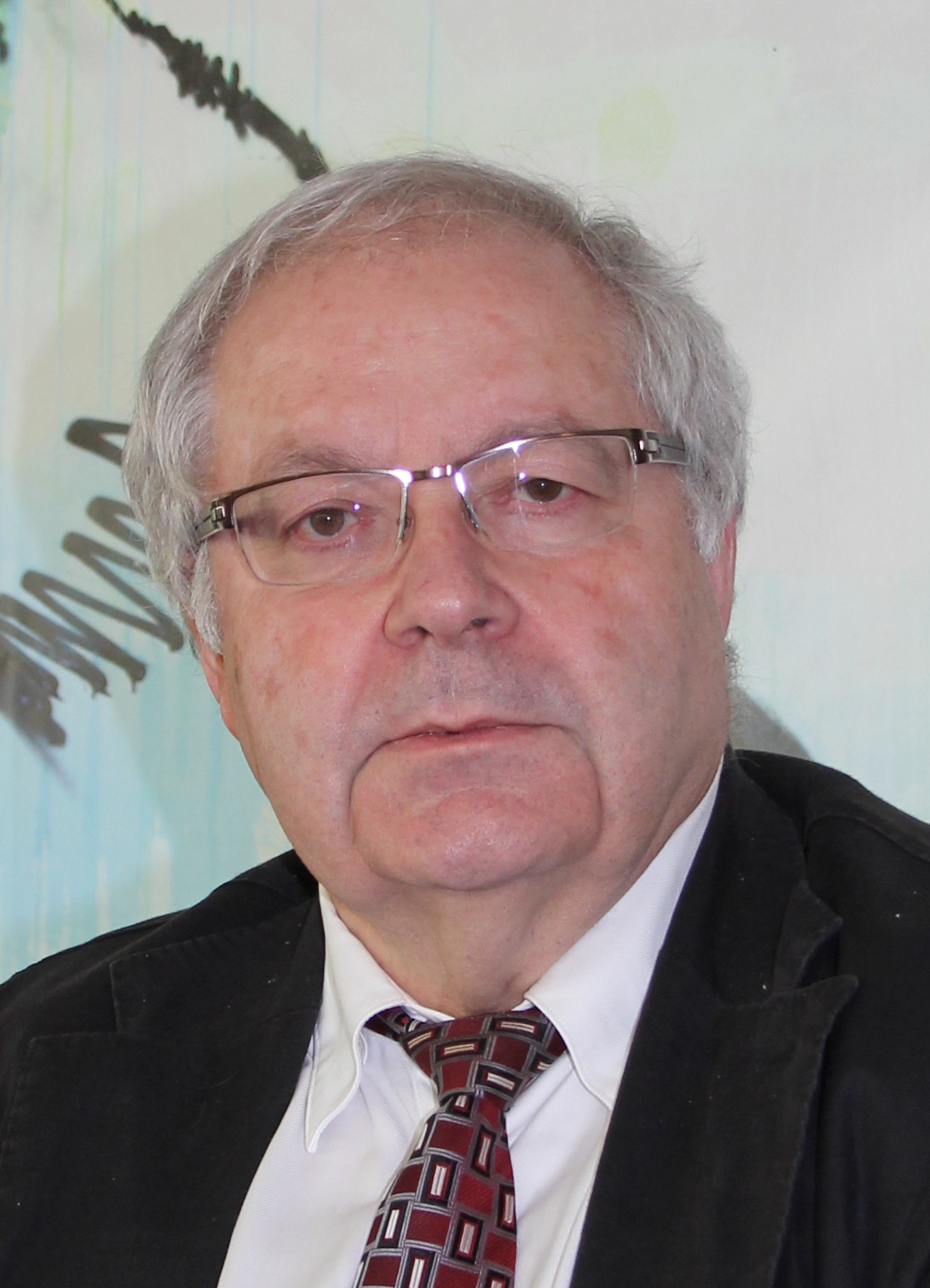
Ingénieur de profession, il a partagé sa vie professionnelle entre la conception, le développement et la validation d’équipements et sous-systèmes embarqués sur des véhicules spatiaux (Aérospatiale, puis EADS, aujourd’hui Ariane Group) et, en parallèle, la formation initiale en écoles d’ingénieurs et la formation continue en entreprise.
Depuis 2009 consultant et formateur en systèmes, et depuis 2015 Secrétaire général de l’AFSCET (Association Française des Systèmes Cybernétiques Cognitifs Et Techniques), il est l’auteur d’une dizaine de communications dans des congrès internationaux de systémique ou d’ingénierie système.
KARAKAS Alexandra
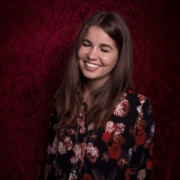
Student from Budapest, Hungary. Her Phd research is connected to malfunction and failure. She started to study art and design theory in 2011 at Moholy-Nagy University of Art and Design in Budapest, and after that she spent the second year of her MA studies in Dublin at the Design History Material Culture Faculty at National College of Art and Design. Currently she is a third year PhD Student at the Department of Philosophy at Eötvös Loránd University. She is teaching research methods at Budapest University of Technology and Economics. Her research focuses on the problem of malfunction in design and technology, and how malfunction manifests in different areas of design.
Doctorante à Budapest, en Hongrie, sa recherche doctorale est liée aux dysfonctionnements et aux échecs. Elle a commencé à étudier l’art et la théorie du design en 2011 à l’Université d’Art et de Design de Moholy-Nagy à Budapest, puis a passé la deuxième année de sa maîtrise à Dublin à la Design History Material Culture Faculty du National College of Art and Design. Elle est actuellement doctorante en troisième année au département de philosophie de l’université Eötvös Loránd. Elle enseigne les méthodes de recherche à l’Université de technologie et d’économie de Budapest. Ses recherches portent sur le problème des dysfonctionnements dans la conception et la technologie, et sur la façon dont les dysfonctionnements se manifestent dans différents domaines de la conception (design).
LAURENT Nathanaël
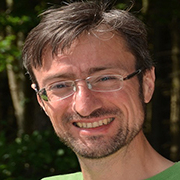
He has completed a doctorate in biomedical sciences at the University of Namur and studied philosophy at the Catholic University of Louvain. He is currently completing a second doctorate in philosophy of biology and holds several teaching positions in higher education. His main areas of interest are epistemology (what can biologists know about life?), Ontology (what is life?) And ethics (what should we to do as living things?).
Il a réalisé un doctorat en sciences biomédicales à l’université de Namur et a étudié la philosophie à l’université catholique de Louvain. Il termine actuellement un second doctorat en philosophie de la biologie et exerce plusieurs charges d’enseignement dans l’enseignement supérieur. Ses principaux centres d’intérêts sont l’épistémologie (qu’est-ce que les biologistes peuvent connaître de la vie?), l’ontologie (qu’est-ce que la vie?) et l’éthique (que devons-nous faire en tant qu’êtres vivants?).
POULLET Yves
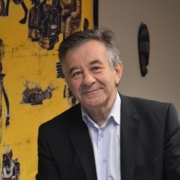
Emeritus professor at the Faculty of Law of the University of Namur, associate professor at the Catholic University of Lille, member of the ETHICS laboratory and co-president of the Namur Digital Institute at the University of Namur. Yves Poullet was rector of the University of Namur, he is a member of the Royal Academy of Belgium and an expert with the Council of Europe and Unesco.
Professeur émérite à la Faculté de droit de l’université de Namur, professeur associé à ETHICS de l’Université Catholique de Lille et co-président du Namur Digital Institute de l’Université de Namur. Yves Poullet a été recteur de l’université de Namur, il est membre de l’académie royale de Belgique et expert auprès du Conseil de l’Europe et de l’Unesco.
TOUVET Peggy
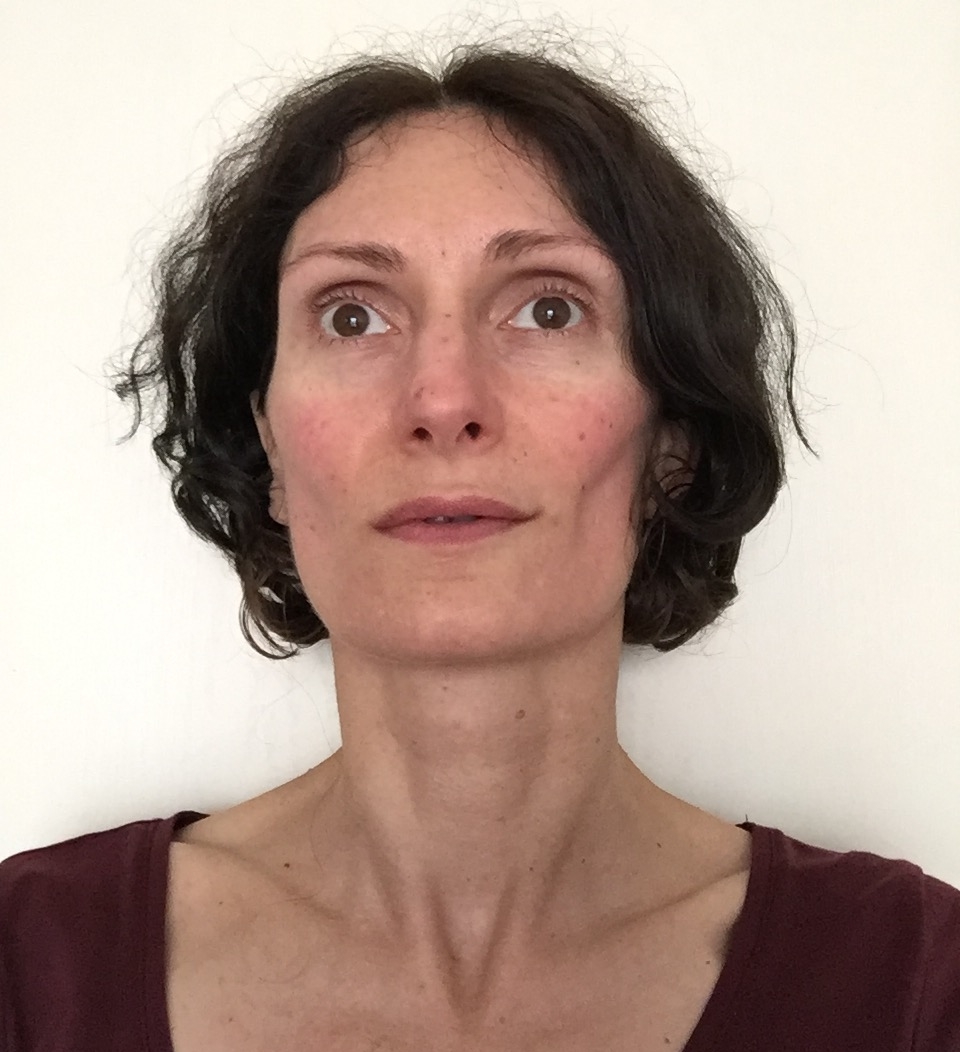
Lecturer in philosophy of science and technology at the University of Technology of Troyes, Attached to the Archives Husserl laboratory of the ENS de Paris. She was a teacher of philosophy and anthropologist of science. She now teaches epistemology at the University of Technology in Troyes, and conducts research that articulates knowledge theory and technology philosophy at the European laboratory « European Culture and Technology » (ECT lab).
Enseignante en philosophie des sciences et des techniques à l’université de technologie de Troyes, rattachée au laboratoire Archives Husserl de l’ENS de Paris. Elle a été enseignante en philosophie et anthropologue des sciences. Elle enseigne aujourd’hui l’épistémologie à l’université de technologie de Troyes, et mène des recherches qui articulent théorie de la connaissance et philosophie de la technologie au laboratoire européen « Culture européenne et technologie » (ECT lab).
XU Ruowen

PhD candidate in Media and Performance Study at Utrecht University.
Organizers
COOREMAN-GUITTIN Talitha

Doctor of Catholic theology, researcher at the RSCS Institute of UCLouvain. His current research in theological ethics focuses on the relevance of maintaining friendships with people with neuro-progressive diseases.
Docteur en théologie catholique, chercheure à l’Institut RSCS de l’UCLouvain. Sa recherche actuelle en éthique théologique se focalise sur la pertinence du maintien de liens d’amitié avec des personnes atteintes de maladies neuro-évolutives.
CRESSMAN Daryl
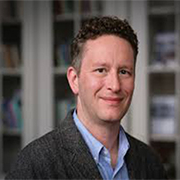
He works at the intersection of the Philosophy of Technology and Science & Technology Studies (STS). He received his PhD from the School of Communication at Simon Fraser University in Vancouver in 2012 where he was a member of Andrew Feenberg’s Applied Communication and Technology Lab. Fascinated by the relationship between technology and musical culture, he wrote his dissertation on how ideas about aesthetics, patronage, and acoustics shaped the design and meaning of Amsterdam’s Concertgebouw. While completing his PhD, Darryl was also involved in studying the relationship between technology and education.
PRINTZ Jacques

Professor at ETHICS, Catholic University of Lille, emeritus professor of Cnam, where he held the chair of software engineering until 2009.
Professeur associé à Ethics, Université Catholique de Lille, professeur émérite du Cnam, où il était jusqu’en 2009 titulaire de la chaire de génie logiciel.
RUFFO DE CALABRE Marie-des-Neiges
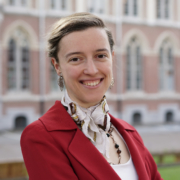
She is post-doc researcher, ETHICS, Catholic University of Lille and associate researcher at St Cyr-Coëtquidan (CREC). She has received a Scientific Prize from the Institute of Advanced National Defense Studies (IHEDN) for her thesis, and she is the author of Itinéraire d’un robot tueur published by Le Pommier (2018). Her research focuses on the ethical questions posed by new autonomous robotic and AI technologies, including their military and intelligence applications.
Elle est post-doctorant à ETHICS, Université Catholique de Lille et chercheur associé à St Cyr-Coëtquidan (CREC). Récompensée d’un Prix scientifique de l’Institut des Hautes Études de Défense Nationale (IHEDN) pour sa thèse, elle est l’auteur d’Itinéraire d’un robot tueur aux éditions le Pommier (2018). Ses recherches portent sur les questions éthiques posées par les nouvelles technologies robotiques autonomes et d’IA, notamment leurs applications militaires ainsi que pour le renseignement.

